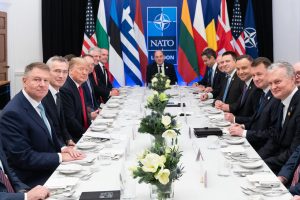Trans-Pacific View author Mercy Kuo regularly engages subject-matter experts, policy practitioners and strategic thinkers across the globe for their diverse insights into U.S. Asia policy. This conversation with Jonathan Holslag – professor of international politics at Free University of Brussels, special adviser to the first vice president of the European Commission and author of numerous publications, including The Silk Road Trap (Polity Press, 2019) – is the 244th in “The Trans-Pacific View Insight Series.”
Identify the top three outcomes of the EU-China summit in September.
I don’t think this summit had any specific outcomes and certainly no “top” outcomes. Its main achievement has been that the communication channels were kept open and perhaps for the Germans, who hold the EU presidency, to show the American government that its partnership with China is still alive. China’s pledge to become carbon neutral by 2060 could be seen as a victory for Berlin, which made it a key objective for the summit, but it remains to be seen whether that will happen and especially whether it will benefit the EU economically.
The fact that the investment treaty talks did not break down entirely can hardly be seen as a very positive outcome, and I would not even consider it a breakthrough as long as the overall unbalance in the economic relationship remains.
How might a possible Biden administration recalibrate transatlantic relations?
While it is often said that Europe needs to become independent, many European countries are desperate to see Biden take the lead. We could expect Europeans to draw more confidence from Biden and accept [the need] to resist China collectively. In practice, however, I do not expect a lot. The trade interests of Germany are such that a tough common China policy will remain difficult. Military capabilities are such that European countries cannot do much to respond to China’s growing clout. The political mindset in general is averse of risk and confrontation. So, we’ll see some closer EU-U.S. cooperation on the surface, but Europe will be reluctant to respond more robustly to China’s rise.
If Trump is re-elected, will the trajectory of transatlantic tensions continue and how could it impact EU China policy?
It would be the end of the Atlantic axis. No doubt. I don’t think NATO, trade and many bilateral partnerships will survive another four years of Trump. It will be an ideal opportunity for China to continue to spread its influence throughout a Eurasia that no longer trusts the U.S., certainly as America’s own balancing efforts are not yet very effective.
How will Brussels balance relations with Beijing and Washington amid the escalation in U.S.-China tensions?
It will be divided with a tendency to stay out. Personally, I have always been of the opinion that the EU could be more useful in a balancing effort to China by preventing its backyard ̶ Africa, the Middle East, and Europe ̶ from further turning into a void. This could give way to a division of labor in which the U.S. has its hands free to pivot to the Indo-Pacific. Yet, I now see the EU neither supporting the U.S. in the Indo-Pacific nor rebuilding its position in its neighborhood. There is a lot being written and declared, such as Germany’s Indo-Pacific strategy and the vow of France to do more in the Mediterranean. But political will and capabilities are limited.
Whether a Biden or Trump White House in 2021, analyze the top four China challenges in transatlantic relations that European and American policymakers should coordinate.
Rebalancing trade. I think that remains the number one issue. With a normal market economy, a trade deficit is not an issue, but in the case of China, it is weaponizing hundreds of billions in trade earnings from the West via state banks and national champions. I think Trump is right on this, even if his policy has failed.
Next, we should continue to have a good understanding about China inside NATO, strengthen NATO countries in their mandate area, work closer together in overcoming A2AD [anti-access/aerial denial] and deal properly with WMD, space and cyber.
Onwards, we should get the partnership with other Eurasian countries right: India, Russia, ASEAN, Turkey and so forth. As long as they stay out of China’s orbit, we can still somewhat balance China’s influence.
Finally, we should stay true to our core values. The main threat to the West is not China, but destroying our position from inside by trampling core values such as democracy and human dignity.
































